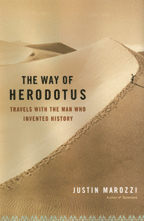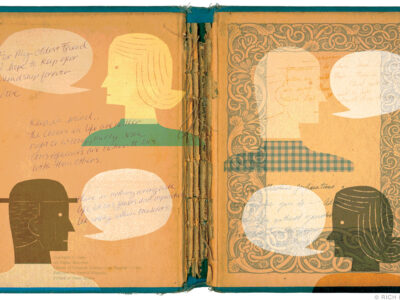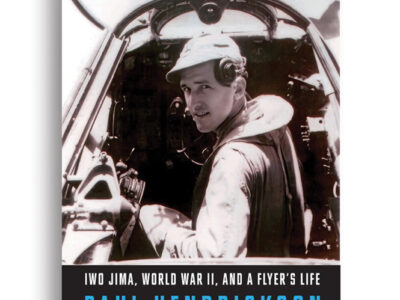
“Herodotus has never quite escaped the slur that he was a bit of a fibber, a fantasist, an elegant charlatan, a classical-world Walter Mitty who told whoppers, a peerless stylist who simply made a lot of it up,” writes Justin Marozzi G’95 in The Way of Herodotus: Travels with the Man Who Invented History, published this year by Da Capo Press. The fifth-century B.C. Greek author wasn’t even mentioned when Marozzi studied history at Cambridge University—the result, he says, of a kind of priggish disdain that goes back to the Romans. While Cicero referred to him as the “Father of History,” Plutarch devoted an entire book to debunking the “Father of Lies.”
But when Marozzi finally encountered Herodotus some years later, he found himself “instantly hooked” by the Histories (“a masterpiece on the grandest scale,” written “with a novelist’s flair for pace and suspense”) and by the man that work reflects: “a personality so obviously effervescent, startlingly modern in outlook, highly amusing, freedom-loving, broad-minded and humane.” Nominally about the Persian Wars but beloved or denigrated for its many colorful digressions, the Histories is generally regarded as the first work of its genre.

In The Way of Herodotus, Marozzi—a travel writer, historian, journalist, and political-risk and security consultant based in London— chronicles his travels to present-day Turkey, Iraq, Egypt, and Greece to retrace the path of his literary soul mate. Having spent a “splendid” year at Penn as a visiting Thouron scholar—though his memories have less to do with the classroom than with frequent excursions to New York and Washington and a “hilarious” road trip to New Orleans and Graceland—Marozzi makes the impulse that led him to write the book sound similarly larkish. He writes that he was inspired by reading Herodotus “one afternoon beneath a slate-grey Norfolk sky” and longing for “his (much warmer) world.” But if better weather provided the impetus, what sustains the book is the relationship between Marozzi and the worldly, wise (though perhaps not always strictly reliable) Herodotus.
Marozzi discussed his imaginary traveling companion and their journey in an email interview with Gazette editor John Prendergast.
Talk a bit about the pros and cons of building a narrative around the combination of your own experience and the historical figure of Herodotus.
I knew Herodotus before I started this project, but not well. Rediscovering him and reading him in the U.K. one winter instantly kindled the desire to get out into the field, join him on the road, test his discoveries, get to know him, understand his writings and what he was trying to say in the Histories, which is about so much more than the Persian Wars.
Building a narrative around Herodotus and my experience seemed both eminently sensible and achievable. In my mind, he is very much a travel writer—as well as many other things, from anthropologist to geographer—so I felt we would be able to complement each other. My background has long been in travel and history. What better figure than Herodotus to unite the two!
You don’t hesitate to suggest how he would have reacted to certain situations or how he would have viewed current events in Iraq, for example. To what extent is he a stand-in for you?
Some critics have criticized me for showing too much certainty in assessing his reactions in certain situations. Funnily enough, I completely disagree! I felt pretty confident in making these remarks. You get to know the man incredibly well in the Histories; there is so much of his character on display. I liked—and like—him enormously and identified with him whole-heartedly and often unconsciously. Stand-in for me? No. I’d say we were able to work together as a team.
How did the mechanics of this work? Was it one long trip or did you break it up? How did you balance the various locations?
Several trips over four years, including a year in Iraq, a month in Greece, a month in Egypt, and about the same again in Turkey. Each location was important in its own way: Turkey for his birthplace and a sense of place generally; Egypt a must because it was his greatest passion—Herodotus the travel writer unleashed in full glory; Greece essential as his cultural homeland, home to Athens, Delphi, Sparta, Olympia, et cetera; and Iraq a fabulous crucible in which to observe some of his theories related to conflict and empire.
Was there a particular place or experience that you would single out as the most memorable of your journey? Anything that stretched the book out of shape?
Greece I think was an unexpected highlight particularly because I had the lowest expectations of it. I have never been drawn to the country, preferring the Muslim world on the whole to travel in Europe. And yet it was mind-blowing for so many reasons—the all-pervasive sense of history, so much of it that the Greeks are rather blasé about it all; the realization here that as much as I loved Herodotus and was focusing on him uniquely, he was simply one great among so many Ancient Greek greats from that utterly mesmerizing time that was the fifth century B.C. Think Aeschylus, Thucydides, Socrates, Sophocles, Pericles, Anaxagoras, Aristophanes, Themistocles …
Given recent history, the section in Iraq looms large for its connection with the themes you lay out of Herodotus’ good example and wise counsel when it comes to religious tolerance, understanding foreign cultural practices and customs, and the dangers of hubris. Was making that point in your mind from the start?
I had no intention really of getting to Iraq for Herodotus until the war in Iraq suddenly presented the opportunity to get out there and visit Babylon—an indulgence, frankly—and once I did the parallels were simply unavoidable in this epic clash of civilizations and cultures. It was often deeply dispiriting and optimism-crushing, and made me appreciate Herodotus’ wisdom and humanity all the more. There is nothing frivolous about war. It’s not something to gamble with in the hope of building something better. And in Iraq the cost of what we today call freedom proved, in my mind at least, completely unacceptable. And I speak as someone who supported the war from the outset.
In the book’s introduction, you make the impulse sound like trying to find a great vacation trip, but there were real dangers involved. What is the attraction for you, in travel and travel-writing generally, and specifically in going to remote places of conflict?
Travel and travel-writing to me represent discovery and exploration, not to mention colossal self-indulgence. I love it. As for remote places of conflict, I learnt some time ago that things are never as bad as they appear in the newspapers. Much of modern life is risk-averse, disappointingly and stultifyingly so. I don’t think conflict is exciting. It is tragic. But I enjoy difficult and remote places, for both the people and the environment in which they live. The difference alone between our world and theirs is deeply thrilling.
EXCERPT
Leaving Babylon
I entered Babylon with an invading army and now I leave in the last available Coalition convoy. The occupation forces are moving on. Camp Babylon is closing down and Polish and American forces are relocating south-east to the town of Diwaniyah. The desecration of Babylon, for the time being at least, is over.
I hitch a ride in one of the few unarmoured Humvees and immediately feel uncomfortably exposed. It’s too late to do anything about it. I’m lucky to get a seat. Body armour has been hung over the doors, almost as an afterthought, to provide a modicum of protection, but serves only to underline how vulnerable the vehicle is. We set off in an untidy straggle like a snake slithering away from trouble. The end-of-an-era atmosphere hangs heavily in the air. I am a short-term imposter but these men have been here for months in what will be a shameful footnote in Babylon’s history. Everyone knows the Iraqis can’t wait for the invaders to leave this place, the symbol of their country’s unrivalled history. Most of the soldiers couldn’t care less. They have just been doing their job.
Babylon is dissolving behind me into my personal history, a fleeting encounter with Herodotus in a city stormed by Cyrus, lead man in the starring quartet of the Histories. My only chance to visit it has been in the midst of a war pitting East against West—which bears, in other words, the echoes of the Persian Wars Herodotus describes. Babylon, in the thousands of years since he wrote about it, has become a one-word code for luxury, extravagance, decadence, confusion, sexual licentiousness and abandon. You could say Herodotus’ early focus on sex in Babylon has left an indelible mark on its reputation as a more upmarket version of Sodom and Gomorrah. The closest we come to it today, perhaps, is Hollywood—without the walls, Tower of Babel and monumental temples.
“Dudes, get this,” says one of the sergeants in the Humvee, turning to me. I see a dusty self-portrait in his wraparound sunglasses. “Justin, you’ll like this, these guys are Brits. Check out our farewell-to-all-this-bullshit song.”
He pushes a button on his portable stereo and a tinny voice vibrates through the sand-smothered speakers. It is an anthem of my childhood. Boney M. 1978.
By the rivers of Babylon,
There we sat down
Ye-ah we wept,
When we remembered Zion …
The wind rushing through the Humvee snatches some of the music away, but I know the words. They have lodged in my memory and cannot be removed. The soldiers hoo-rah and whistle. “Rock ’n’ roll, baby!” one of them screams, kicking off another round of celebrations. Their time in Babylon has come to an end. They are a step nearer home.
From the book The Way of Herodotus, by Justin Marozzi. Excerpted by arrangement with Da Capo Press (www.dacapopress.com), a member of the Perseus Book Group. Copyright © 2009.




